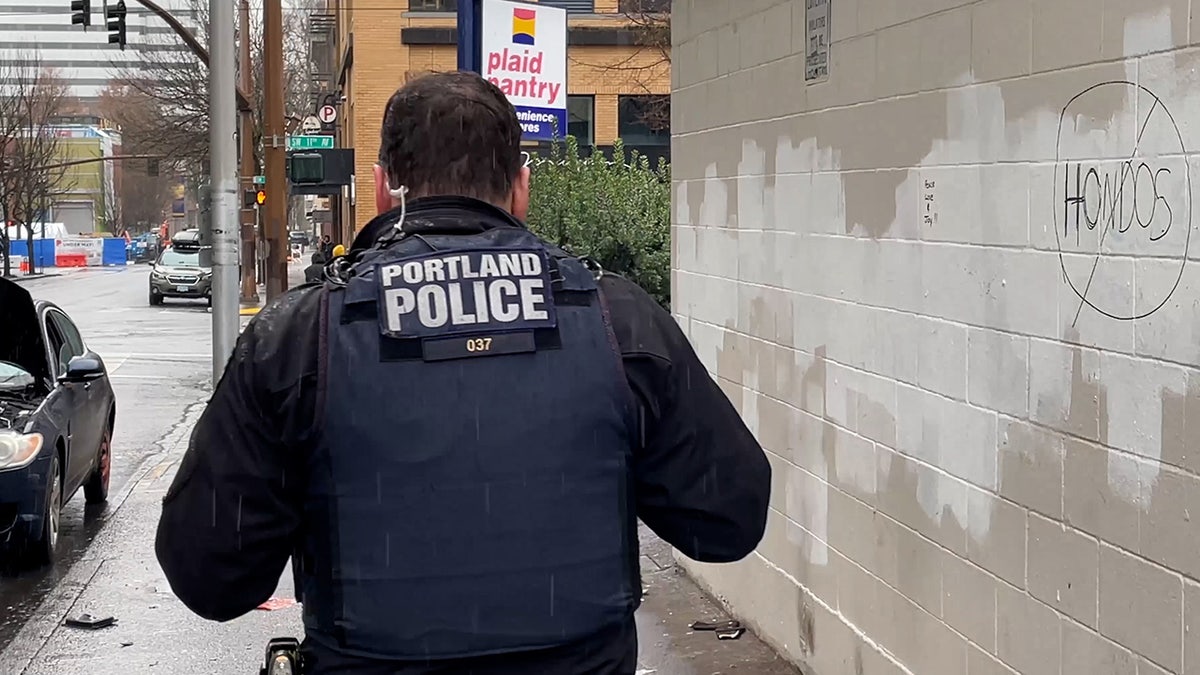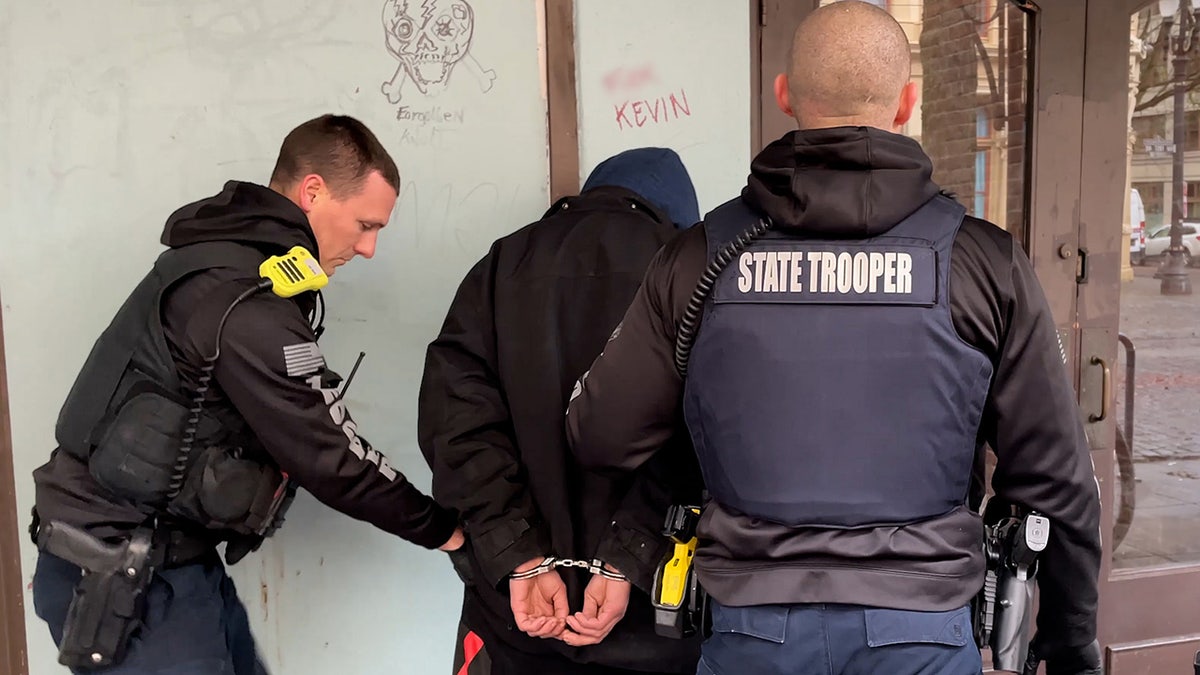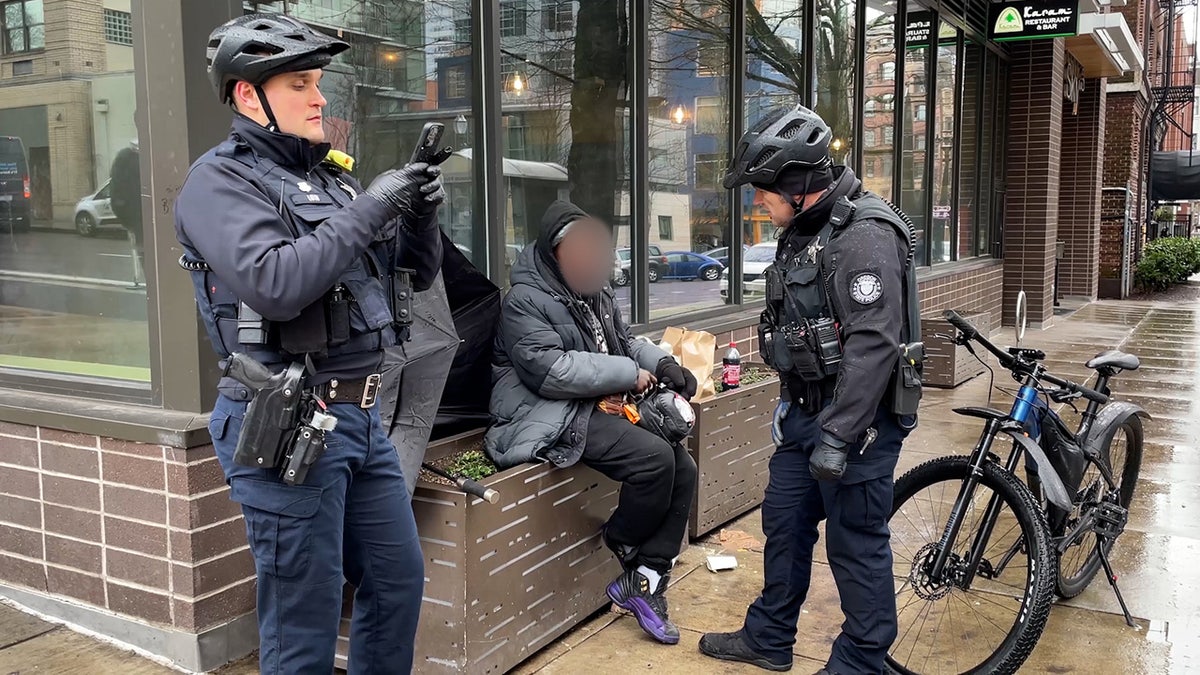PORTLAND, Ore. – The Rose City’s addiction crisis is evident not just by the burnt foils and unconscious drug users downtown, but by the city’s graffiti. A meth pipe doodled on the sidewalk. The word “Hondos” with a circle and slash over it scribbled on a wall, likely a reference to the Honduran cartels accused of funneling fentanyl into Portland.
“We as a unit are out here always looking to disrupt the fentanyl trade because a lot of the crimes and a lot of the complaints we get here in the community and downtown, all those roads lead back to fentanyl,” Portland police officer David Baer said.

Portland police officer David Baer responds to an incident in downtown Portland on Jan. 11, 2024. (Hannah Ray Lambert/Fox News Digital)
CRISIS IN THE NORTHWEST: ARE VOTERS ‘BEYOND A TURNING POINT’ AFTER DECADES OF PROGRESSIVE POLITICS?
On a rainy afternoon in January, staffing was down more than 50% at the Portland Police Bureau’s Central Precinct, which covers 41 square miles in the heart of the city. Dozens of calls waited for a response.
“We have a shift minimum of 18 officers,” Baehr said. “We currently have eight officers deployed for the entirety of Central Precinct.”
But Oregon State Police troopers were also downtown, offering local officers some relief as part of an ongoing partnership intended to clean up the city.
Gov. Tina Kotek last fall directed OSP to send some troopers to Portland to help local law enforcement track and bust fentanyl dealers. Baehr, who is part of PPB’s bike squad, said troopers have doubled — even tripled — the amount of work his team can do.
“It’s been really helpful. We’ve definitely seen a reduction in the open-air drug dealing that we saw in the summer that was really rampant,” he said, an improvement he attributes to PPB and OSP’s efforts.

Last fall, Gov. Tina Kotek diverted some Oregon State Police troopers to Portland, where they have been helping local law enforcement track and arrest fentanyl dealers and respond to other crimes. (Hannah Ray Lambert/Fox News Digital)
Fentanyl started taking off in Oregon around 2018. Since then, overdose deaths attributed to synthetic opioids have surged 533% in Multnomah County, according to local health officials.
Downtown Portland has been ground zero for the crisis.
Bicycle officers, state troopers and undercover detectives since October have made dozens of arrests, seized weapons and taken thousands of fentanyl pills off the streets. State and local police are going after “mid-level managers and up,” Baer said, dealers who are most likely to be armed and involved in shootings downtown.
“We want to make downtown livable for the people that do live here and come down here to recreate,” Baer said. “And we want to make it uncomfortable for drug dealers, especially those that are going to carry guns in the commission of a drug trafficking crime.”
PORTLAND POLICE GET NEW HELP TACKLING FENTANYL CRISIS:
WATCH MORE FOX NEWS DIGITAL ORIGINALS HERE
While Baer said police have made a dent in drug dealing, public drug use has been more difficult to deter.
Oregon decriminalized possession of user amounts of drugs three years ago. Now, officers merely write drug users a $100 ticket and give them a number to call if they want treatment — or just to avoid the fine. Most of the people they encounter don’t pay the fine or call the hotline, according to Oregon Judicial Department data.
Portland leaders have tried to crack down on public drug use and prohibit camping in busy commercial areas, but are often thwarted by state laws or court challenges. The city’s ban on public drug use is stalled until state lawmakers pass new substance use laws, something Wheeler and his colleagues hope happens during the short session that began Monday.
“I have a zero tolerance policy for selling or distributing or even using drugs in open on our streets,” Wheeler said. “But we also want to connect people to help.”
The city recently piloted a program combining police officers and social workers to improve outreach to people suffering from addiction. Both Wheeler and Baer were complimentary of the partnership and said it has helped get people off the streets and connected to services.

Oregon State Police troopers cited a woman for public drug use in downtown Portland on Jan. 11, 2024. She told them she wanted to get treatment for her addiction, so they contacted peer support specialists through a new pilot program and waited with her until they arrived. (Hannah Ray Lambert/Fox News Digital)
‘THIS IS THE WILD WEST’: LONG POLICE WAIT TIMES IN MAJOR CITIES LEAVE VICTIMS FEELING HELPLESS
“All the things that our team is responsible for being able to manage and know where [treatment] beds are open and where spots are open and what’s the criteria for that? It was, frankly, too much,” Baer said.
Now, when officers find someone using drugs in public who says they’d like to get treatment, they can call service providers who, ideally, respond within 10 minutes to take over the interaction.
The program, which began a couple months ago, has shown “really good progress,” Wheeler said.
It’s a cultural shift in the city, where activists and some residents called for defunding the police in 2020. The city rolled out Portland Street Response the following year, sending mental health workers and paramedics to nonviolent calls in hopes of cutting down on the number of police interactions with people in crisis.

Officer Donny Mathew approaches a man acting erratically in Portland’s Chinatown district on Jan. 11, 2024. (Hannah Ray Lambert/Fox News Digital)
CLICK HERE TO GET THE FOX NEWS APP
Wheeler acknowledged initial resistance from some social workers who “did not want to pair up with police officers.”
“Now they’re working together really well,” he said. “I think they all realize they share the same values. They’re all approaching this drug addiction crisis from a humanitarian perspective. And I literally just got back from a meeting where the social workers were singing the praises of the police officers who are assigned to this detail.”
Click here to hear more from Baer and Wheeler.